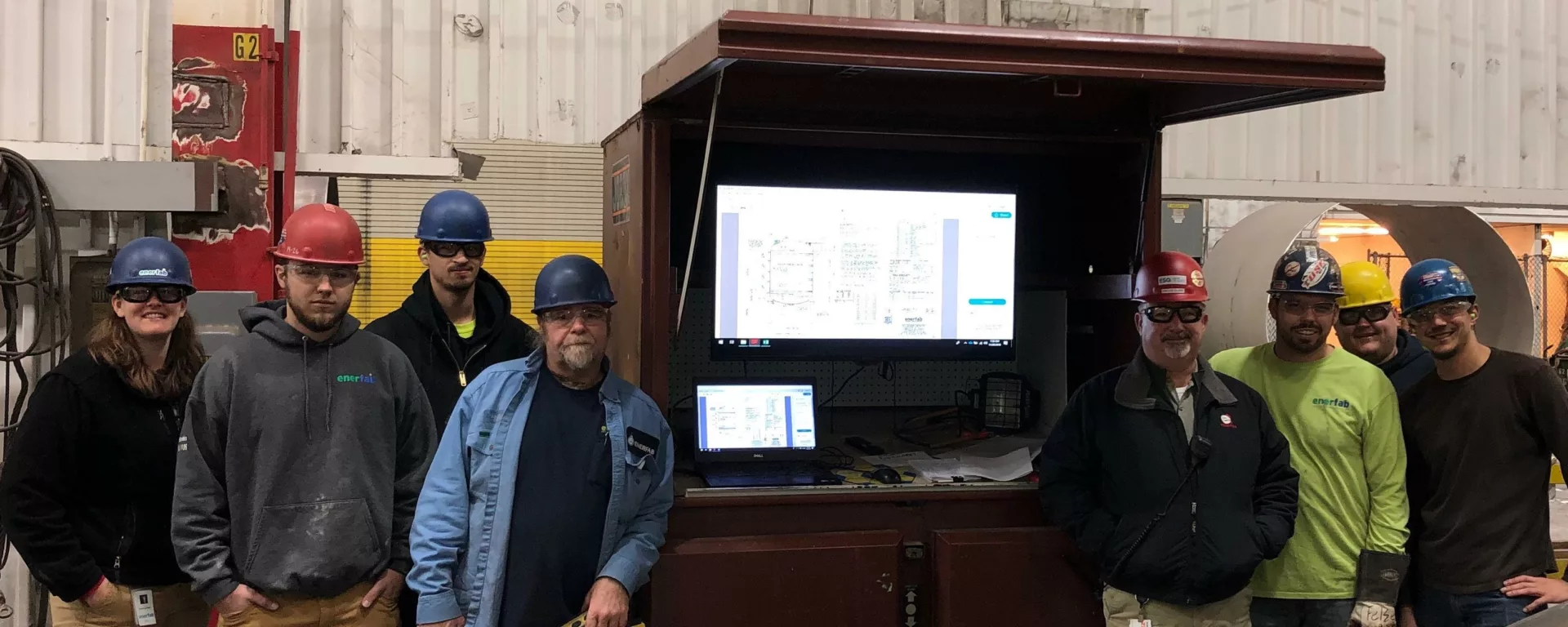There are two types of construction professionals: those who love and want to be the best at what they do as craftsmen (these professionals just want to weld, as an example, and go home every day) and those who aspire to learn additional skills to further their career. I’m not saying that everyone who is a journeyman wants to grow out of pipefitting. If you love what you do as a craftsman — that’s amazing! I hope you continue to love it, and I hope you get to do it at Enerfab. Nor am I saying that if you stick with craftwork, you are stuck in terms of career growth. Quite to the contrary — there are lots of ways to grow in your career as a craftsman. But, if you are the type who wants to get out of the day-to-day call to be a journeyman, you’ll need to be deliberate about it, and that’s where establishing a personal brand can help.
Whether you’re looking to get into a management, estimating, or safety position, you’ve just got to take a couple of steps to get there. A good framework for building out a plan is to map a path and be resourceful, commit to your goals with accountability, let the world know what you’re up to and what you want — including your employer — and say yes to opportunities when they arise.
Map a Path
You have a vision to do something different, and there are a million ways to get there. The good news is that mapping the path doesn’t have to be complicated. Starting can be as simple as signing up for classes at the Union Hall. They’re always offering continuing education. As we look to the future, there’s going to be a lot more opportunity in digital and technological spaces, so maybe you could take a BIM class or learn how to use a laser scanner. Maybe you want to be an estimator. (There’s a huge need for estimators!) Take an Excel class, take an estimating class through the union, and do that kind of stuff.
If you have an idea of what you want to do, but you aren’t sure what the non-negotiable steps are on the path to getting there, then I encourage you to spend time with people who have already done what you want to do. If you see a path to safety, for example, start spending some time with the safety guys. Ask questions and start figuring out what you must do. Do you need to take your 510? Maybe when you are off work over the summer, you go to the Ashland Technical Community College and take a 510 OSHA class because that’s kind of the precursor to getting into safety. Take some time to figure out what the necessary qualifications or certifications are for an area of interest that you don’t currently have, and then make plans to get that training.
Be Resourceful
As for how you will make courses, certifications, and other training happen — you’ve got to use your resources and ask! I bet union halls are willing to pay for more things than you realize. I bet there are classes out there that you didn’t even know were available online. Unions are going through technological advances just like contractors and owners are. It wasn’t that long ago when they didn’t even have online classes so that push of being able to do education from anywhere presents real opportunities.
Make Yourself Accountable
Now, as helpful as it is to map out your goals with actionable steps, it’s important to set it up in a way that helps you get it done. There’s something about going to class that is different from remote learning, for instance. With online classes, you have the convenience of flexibility, but you get busy. You may think, I’m here tonight. I’m going to knock out that online class that I need to do for my apprenticeship. But you’re tired and eat dinner. You crack open a beer, and you think, I’ll do it tomorrow, and that keeps happening.
If you don’t struggle with tackling online work, then go for it! But, if you need a structure that forces your commitment, consider in-person courses. It’s just like exercising with a personal trainer. The setup creates accountability. It gets you in the gym every day because you’re paying the trainer, and you don’t want to let them down. You don’t want to waste their time, and you’re making a commitment. Think of the additional training and skills you need for your career in the same way. Set it up so that accountability makes it hard not to commit.
Tell the World What You Can Do & What You Want
Once you’ve identified a path and taken some of the steps along it, it’s important to let people know. You are putting good work in to better yourself and grow in a specific direction. To unlock opportunities, make sure others know what you can do! That’s what I mean when I say building your brand. It’s about working hard to become skilled in something you’re passionate about and then becoming known for it. You can highlight your skills on your LinkedIn page. Keep your certifications and training up to date and reach out to key contractors.
You know who else you should tell? Your employer. Hopefully, you’re working for us. In this case, just come to management like Zach Miller did. Zach works in our quality department. He’s come to me for the last couple of years and said, “I want to be a project manager. I want to take on more opportunities. Eventually, I’d like to run a site for you.” He’s done all the things I’ve told him he needs to do, and on top of that, he took it upon himself to go out and get his API 653, which just makes him that much more valuable to Enerfab. Now I think about him differently. What’s the next position that we might be able to utilize him on as we’re looking at new opportunities? Zach is building his brand.
Zach’s case shows that your employer can be a champion in supporting your growth. When you think about it, the hard work you put into yourself isn’t just helpful to you — it can be a powerful value-add to your employer, too. A good example is when Enerfab goes out and talks to customers. We can say that we have key people on the team with specific expertise.
Aligning Your Passion with Your Employer’s Needs
You may be wondering if your employer will care or have use of the direction in which you want to grow. If you can reasonably identify how the skills you want would be useful to your employer, you have a good chance of getting a positive response! I have a guy up in Michigan who shared this plan: He’s going to go and get his drone license on his own off to the side. He’s passionate about it, but he also thinks he can help if he has a drone license. He can start taking cool marketing videos and look at sites a little differently, and that may turn into his own business someday. On one hand, I want him to be a pipefitter forever, but on the other, we’re all about this guy building his personal brand and trying to figure out what that means long-term. If drones are something he’s passionate about, we can use them.
Say Yes
A lot of building your personal brand is not saying no when opportunities arise and being game to figure out the solution to a challenge. Once you’ve acquired must-have skills and certifications and you’ve let the world know what you can do, you need to round out your abilities with experience! Enerfab needs people with skills and passion, so when opportunities come your way, say yes!
Again, building your brand is all about working hard to become skilled in something you’re passionate about and then becoming known for it. If you’re looking to get out of everyday craft work, start thinking about what you like and what you want, but above all — get going. You can have an incredible vision for yourself, and I can provide endless guidance on how to get there, but it’s meaningless if you don’t go out there and make it happen. You don’t have to do it all at once — even small steps accumulate! — but you are the only one who can turn dreams into reality. If you set out to build a personal brand and you commit to the work, you’ll find yourself accessing incredible professional opportunities before you know it.




